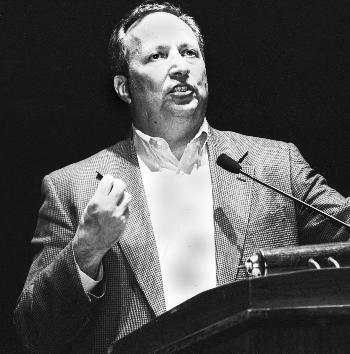
News
Summers Will Not Finish Semester of Teaching as Harvard Investigates Epstein Ties

News
Harvard College Students Report Favoring Divestment from Israel in HUA Survey

News
‘He Should Resign’: Harvard Undergrads Take Hard Line Against Summers Over Epstein Scandal

News
Harvard To Launch New Investigation Into Epstein’s Ties to Summers, Other University Affiliates

News
Harvard Students To Vote on Divestment From Israel in Inaugural HUA Election Survey
Summers Addresses Summer School

University President Lawrence H. Summers encouraged Harvard Summer School students to learn and make the most of their time at Harvard in a speech Wednesday that marked the first time a Harvard president has ever addressed a Summer School-only audience.
Summers’ remarks focused on how globalization and technological advancements have caused the world to change rapidly.
Summers told students of a 1997 visit he took to Côte d’Ivoire, where en route to a traditional local ceremony, he took a cell phone call from then-Secretary of the Treasury Robert E. Rubin ’60 while in the middle of a lagoon. He said this experience highlighted how technology can bring people around the world closer together.
“We’re living in a world in which command and control and hierarchy are giving way to interconnectedness and entrepreneurship,” Summers said.
Summers told a packed auditorium of Summer School students, many of whom were international students, that just a few decades ago students at the Summer School had an “exotic background” if they came from west of the Mississippi River.
Summers urged Summer School students to “learn how to learn” in order to keep up with the fast pace of technological and institutional change.
“Nothing you learn as a fact about something important is going to stay a fact about something important by the time you retire,” he said.
After his brief speech, Summers took questions from the crowd on topics ranging from Harvard’s financial aid policy to how the University handles rape cases.
When asked about Harvard’s financial aid policy, Summers said he was committed to bringing international students and students from low-income backgrounds to Harvard.
“We are the only university in the country that extends the principle of need-based financial aid to students outside the United States,” Summers said.
“We’ve had policies that have enabled students to come study at Harvard College—financial aid, scholarhips, summer jobs,” he added. “I would like to extend that policy to other parts of Harvard—to people who come here to learn to be teachers, to people who come here to learn to be physicians.”
One SSP student questioned Summers’ praise for globalization and brought up Nobel Prize-winning economist Joseph Stiglitz’s book Globalization and its Discontents, which criticizes globalization as failing to provide for poor people in developing countries.
Summers said that while he respected Stiglitz as a theoretical economist, he found that Stiglitz’s book was “shot through with factual inaccuracies,” and that some of his challenges made him “very angry.”
“Most of the references that include my name may or may not be accurate,” Summers said of the book. “The majority of the factual assertions are wrong.”
But many of the questions asked of Summers were light, such as “If you were the President of the United States for a day, what would you do?”
Before the speech, the huge crowd his address drew buzzed with excitement and chattering as Summer School students awaited the Harvard president’s remarks.
After the event, the former U.S. treasury secretary was surrounded by students requesting pictures with him, as well as his autograph on one dollar bills.
—Staff writer Stephanie M. Skier can be reached at skier@fas.harvard.edu.
Want to keep up with breaking news? Subscribe to our email newsletter.
